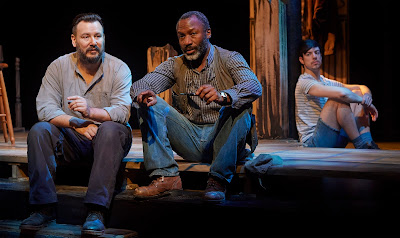Michele Smith and Dean Gilmour
are the dynamic duo who created Theatre Smith-Gilmour in 1980. In some 40
productions since then, they have proven to be ambitious, inventive,
enterprising and just plain bloody good. If they have any competition in
longevity and creativity, I am not aware of it.
This year they have taken a huge
bite – Victor Hugo’s massive Les Misérables - and offered a
series of dramatic scenes from the novel. Even though a large swath of the
novel is taken up by essays on various subject, the idea of presenting the main
plot thread involving the hero Jean Valjean is simply breathtaking. To give you
an idea of the size of the novel, I have an old edition that runs to four
volumes.
Smith and Gilmour have six actors
represent some 29 characters. The action takes place on a bare stage with a few
props and some video projections. Much of the action is mimed and the play does
achieve some very dramatic moments. But it also contains an inordinate amount
of Dickensian melodrama and sentimentality, and numerous coincidences without
Dickens’ humour.
The action is launched with Gilmour
as Valjean telling us about his arrest and conviction for stealing a loaf of
bread from a bakery in order to stave off gnawing hunger. Gilmour does
impressive acting and miming of events in Valjean’s life. He is sent to prison
for five years to serve in a galley. His sentence is increased to 19 years for
his attempts at escape and the story continues.
On his release Valjean is
mistreated because he carries the yellow passport of a convict but he finds
shelter and food in the house of a bishop. He steals silver from the bishop, is
caught and the bishop pretends that he gave the silver to him. We have met
generosity and nobility.
We meet the beautiful Fantine
(Nina Gilmour) who has an illegitimate child and has an extremely difficult
time surviving. She gives her child to the evil Thenardier couple (Daniel
Roberts and Diana Tso) who extract money from her. After some melodramatic
scenes, she dies and we will have her daughter Cossette (played by Nina
Gilmour) for the rest of the play.
One of the main plot threads is
the vengeful pursuit of Valjean by the relentless and merciless Inspector
Javert (Mac Fyfe). The other pursuit is by Marius (Benjamin Muir) of Cossette.
He is a caricature of the obsessed romantic lover who runs into more obstacles
than a steeplechase.
The personal histories are intertwined
with national events including war and revolution as Hugo covered a large
portion of history and Gilmour and Smith attempt to do justice to the novel. I
think they try to chew much more than is possible even in two hours and forty
minutes.
Marius’s pursuit of Cossette
becomes tiresome because there is overstated ardour without humour. Scenes that
may be dramatic become simply sentimental, almost mawkish, and in the end your
interest in Valjean’s fate is seriously diminished. When Valjean is given another
chance to exterminate the creepy Inspector Javert and he decides to be
merciful, I felt like screaming “Blow the bastard’s head off.”
The six actors’ ability to take
on numerous roles is admirable and I don’t want to take anything away Michele
Smith’s deft directing and the couple’s brave attempt to give us their stage presentation
of a small part of a massive novel. In
the end it is a noble attempt at an impossible task that has some redeeming
features but also some big potholes.
___
Les Misérables by Victor Hugo adapted by Michele Smith and Dean
Gilmour continues until April 1, 2018 at The Theatre Centre, 1115 Queen St.
West, Toronto, Ontario. http://theatresmithgilmour.com/
or www.theatrecentre.org


















